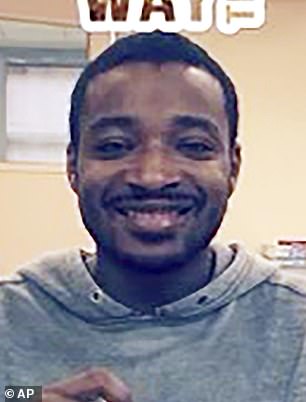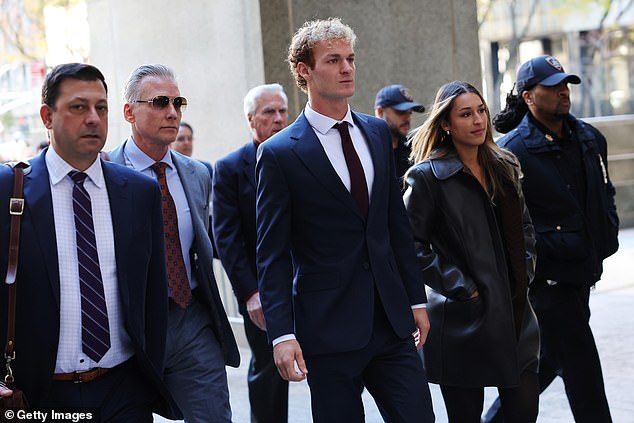Psychiatrist drops bombshell testimony about Jordan Neely – after prosecutors tried to silence him from Daniel Penny’s chokehold trial
A forensic psychiatrist testified that Jordan Neely had been hospitalized more than a dozen times for psychotic episodes and that he was heavily abusing drugs before his death on a Manhattan train.
Dr. Alexander Bardey took the stand in the trial of Daniel Penny, 26, a Navy veteran who put Neely in a fatal chokehold when the homeless man threatened passengers on a subway train in May 2023.
Witnesses said Neely yelled at passengers that someone was “going to die” on the train, and Penny said he intervened when Neely approached a woman with a child in a stroller.
According to Bardey, a defense expert who reviewed Neely’s medical history, he suffered from severe schizophrenia for years, including believing that the late rapper Tupac Shakur told him to “change the world.”
Neely also suffered from “paranoid fears that people want to hurt him,” “grand delusions that people are jealous of him,” and reported hearing “the voice of the devil.”
Despite the shocking nature of Neely’s history, Manhattan prosecutors had tried to keep Bardey’s testimony out of the trial and attempted to withhold evidence of Neely’s mental illness and drug abuse from Penny’s jury.
The case has become a divisive issue since BLM noted Neely’s death last year, claiming it was the racist murder of a homeless black man by an overzealous young white military veteran.
As the case gained national attention, others said Penny is a hero and a modern-day Batman who has saved dozens of others from a violent criminal on a crowded subway.
Daniel Penny is charged with manslaughter and negligent homicide in the death of homeless man Jordan Neely, who he placed in a chokehold when Neely began threatening and assaulting subway passengers

A subway passenger filmed the moment Penny put Neely in a fatal chokehold in May 2023
In his testimony, Bardey said he reviewed thousands of pages of Neely’s medical records from 2015.
Bardey previously worked for the Rikers Island jail, and witnesses said Neely shouted about his willingness to return to prison as he threatened subway passengers.
He said he had worked on hundreds of cases of schizophrenia patients, and said Neel’s case was among the worst of his career.
“His symptoms I would classify as severe,” Bardey testified.
“He describes paranoid fears that people want to hurt him, grandiose delusions that people are jealous of him, said Tupac told him to change the world, and that’s what he did.”
Bardey brought up several examples of Neely’s serious mental illness, including twice when he told hospital staff that Tupac told him to “change the world.”
“When asked to elaborate, he made a fuss about people changing their hair color and giving out free food,” he added.


The May 2023 incident caused an uproar in America – BLM says it was the racist murder of a mentally ill black man by an overzealous white military veteran

Penny (who was seen in court on November 18) also had character witnesses testify about his nature, including his mother and two Marines who served with him overseas

Dr. Alexander Bardey, a forensic psychiatrist and former Rikers Island psychiatrist, testified that Neely had been hospitalized more than a dozen times for psychotic episodes and was heavily abusing drugs before his death.
In support of the defense’s contention that Neely was not a victim of the incident that led to his death, Bardel described the homeless man as “aggressive and bizarre.”
Cases of paranoid schizophrenia are known to be caused by several factors, and Bardey said a toxicology report showed Neely was abusing synthetic marijuana at the time, which he said could have had serious consequences.
The psychiatrist’s testimony came after the defense brought character witnesses to testify about Penny’s character, including his mother and two Marines who served overseas with him.
One of them noted that Penny received a Humanitarian Service Medal for his efforts after Hurricane Florence in 2018, reports Fox News.
Earlier in the trial, stunning bodycam footage from the scene where Neely died was played in court – shockingly revealing that police officers discovered a heartbeat on Neely after Penny released him.

In the bodycam footage seen during the trial, Penny waited on the left for police to arrive. He calmly told them, “I got him out,” when asked how Neely became unconscious
The footage showed NYPD officers arriving on the train at Fulton Station at 2:33 p.m. and speaking to witnesses and Penny on the subway.
“I have a heartbeat,” someone said. A second police officer confirmed that he also felt a heartbeat.
Neely was unconscious and lying on the floor of the subway. When asked how Neely got there, Penny calmly replied, “I kicked him out.”
The homeless man was not pronounced dead until he arrived at Lenox Health Hospital in Greenwich Village later that afternoon.
Among the witnesses on the first day of evidence was an NYPD sergeant who testified that no one on his team had conducted hand-to-mouth enforcement against Neely because he was a “drug user.”
“He appeared to be a drug user. He was an apparent drug user. He was very dirty. I didn’t want them to… get hepatitis.
“If he woke up he would have thrown up. I didn’t want my agents to do that. He was dirty. He looked like a homeless person. You must protect your officer,
“I wouldn’t want my officer to get sick if the person vomits,” he said.
The trial is expected to last six weeks and will involve medical experts, first responders and other passengers who were on the train that day.
